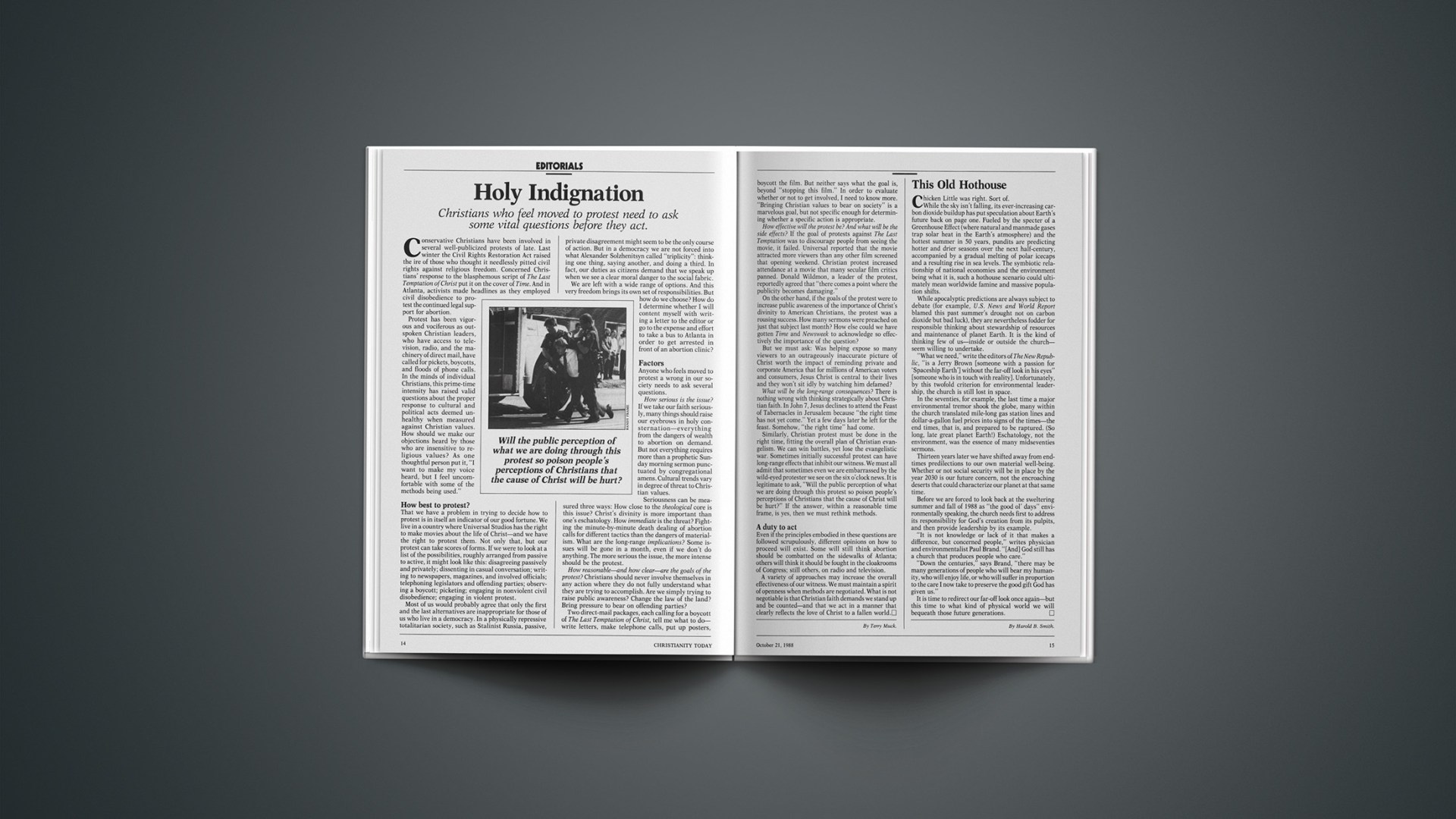Christians who feel moved to protest need to ask some vital questions before they act.
Conservative Christians have been involved in several well-publicized protests of late. Last winter the Civil Rights Restoration Act raised the ire of those who thought it needlessly pitted civil rights against religious freedom. Concerned Christians’ response to the blasphemous script of The Last Temptation of Christ put it on the cover of Time. And in Atlanta, activists made headlines as they employed civil disobedience to protest the continued legal support for abortion.
Protest has been vigorous and vociferous as outspoken Christian leaders, who have access to television, radio, and the machinery of direct mail, have called for pickets, boycotts, and floods of phone calls. In the minds of individual Christians, this prime-time intensity has raised valid questions about the proper response to cultural and political acts deemed unhealthy when measured against Christian values. How should we make our objections heard by those who are insensitive to religious values? As one thoughtful person put it, “I want to make my voice heard, but I feel uncomfortable with some of the methods being used.”
How Best To Protest?
That we have a problem in trying to decide how to protest is in itself an indicator of our good fortune. We live in a country where Universal Studios has the right to make movies about the life of Christ—and we have the right to protest them. Not only that, but our protest can take scores of forms. If we were to look at a list of the possibilities, roughly arranged from passive to active, it might look like this: disagreeing passively and privately; dissenting in casual conversation; writing to newspapers, magazines, and involved officials; telephoning legislators and offending parties; observing a boycott; picketing; engaging in nonviolent civil disobedience; engaging in violent protest.
Most of us would probably agree that only the first and the last alternatives are inappropriate for those of us who live in a democracy. In a physically repressive totalitarian society, such as Stalinist Russia, passive, private disagreement might seem to be the only course of action. But in a democracy we are not forced into what Alexander Solzhenitsyn called “triplicity”: thinking one thing, saying another, and doing a third. In fact, our duties as citizens demand that we speak up when we see a clear moral danger to the social fabric.
We are left with a wide range of options. And this very freedom brings its own set of responsibilities. But how do we choose? How do I determine whether I will content myself with writing a letter to the editor or go to the expense and effort to take a bus to Atlanta in order to get arrested in front of an abortion clinic?
Factors
Anyone who feels moved to protest a wrong in our society needs to ask several questions.
How serious is the issue? If we take our faith seriously, many things should raise our eyebrows in holy consternation—everything from the dangers of wealth to abortion on demand. But not everything requires more than a prophetic Sunday morning sermon punctuated by congregational amens. Cultural trends vary in degree of threat to Christian values.
Seriousness can be measured three ways: How close to the theological core is this issue? Christ’s divinity is more important than one’s eschatology. How immediate is the threat? Fighting the minute-by-minute death dealing of abortion calls for different tactics than the dangers of materialism. What are the long-range implications? Some issues will be gone in a month, even if we don’t do anything. The more serious the issue, the more intense should be the protest.
How reasonable—and how clear—are the goals of the protest? Christians should never involve themselves in any action where they do not fully understand what they are trying to accomplish. Are we simply trying to raise public awareness? Change the law of the land? Bring pressure to bear on offending parties?
Two direct-mail packages, each calling for a boycott of The Last Temptation of Christ, tell me what to do—write letters, make telephone calls, put up posters, boycott the film. But neither says what the goal is, beyond “stopping this film.” In order to evaluate whether or not to get involved, I need to know more. “Bringing Christian values to bear on society” is a marvelous goal, but not specific enough for determining whether a specific action is appropriate.
How effective will the protest be? And what will be the side effects? If the goal of protests against The Last Temptation was to discourage people from seeing the movie, it failed. Universal reported that the movie attracted more viewers than any other film screened that opening weekend. Christian protest increased attendance at a movie that many secular film critics panned. Donald Wildmon, a leader of the protest, reportedly agreed that “there comes a point where the publicity becomes damaging.”
On the other hand, if the goals of the protest were to increase public awareness of the importance of Christ’s divinity to American Christians, the protest was a rousing success. How many sermons were preached on just that subject last month? How else could we have gotten Time and Newsweek to acknowledge so effectively the importance of the question?
But we must ask: Was helping expose so many viewers to an outrageously inaccurate picture of Christ worth the impact of reminding private and corporate America that for millions of American voters and consumers, Jesus Christ is central to their lives and they won’t sit idly by watching him defamed?
What will be the long-range consequences? There is nothing wrong with thinking strategically about Christian faith. In John 7, Jesus declines to attend the Feast of Tabernacles in Jerusalem because “the right time has not yet come.” Yet a few days later he left for the feast. Somehow, “the right time” had come.
Similarly, Christian protest must be done in the right time, fitting the overall plan of Christian evangelism. We can win battles, yet lose the evangelistic war. Sometimes initially successful protest can have long-range effects that inhibit our witness. We must all admit that sometimes even we are embarrassed by the wild-eyed protester we see on the six o’clock news. It is legitimate to ask, “Will the public perception of what we are doing through this protest so poison people’s perceptions of Christians that the cause of Christ will be hurt?” If the answer, within a reasonable time frame, is yes, then we must rethink methods.
A Duty To Act
Even if the principles embodied in these questions are followed scrupulously, different opinions on how to proceed will exist. Some will still think abortion should be combatted on the sidewalks of Atlanta; others will think it should be fought in the cloakrooms of Congress; still others, on radio and television.
A variety of approaches may increase the overall effectiveness of our witness. We must maintain a spirit of openness when methods are negotiated. What is not negotiable is that Christian faith demands we stand up and be counted—and that we act in a manner that clearly reflects the love of Christ to a fallen world.
By Terry Muck.
This Old Hothouse
Chicken Little was right. Sort of.
While the sky isn’t falling, its ever-increasing carbon dioxide buildup has put speculation about Earth’s future back on page one. Fueled by the specter of a Greenhouse Effect (where natural and manmade gases trap solar heat in the Earth’s atmosphere) and the hottest summer in 50 years, pundits are predicting hotter and drier seasons over the next half-century, accompanied by a gradual melting of polar icecaps and a resulting rise in sea levels. The symbiotic relationship of national economies and the environment being what it is, such a hothouse scenario could ultimately mean worldwide famine and massive population shifts.
While apocalyptic predictions are always subject to debate (for example, U.S. News and World Report blamed this past summer’s drought not on carbon dioxide but bad luck), they are nevertheless fodder for responsible thinking about stewardship of resources and maintenance of planet Earth. It is the kind of thinking few of us—inside or outside the church—seem willing to undertake.
“What we need,” write the editors of The New Republic, “is a Jerry Brown [someone with a passion for ‘Spaceship Earth’] without the far-off look in his eyes” [someone who is in touch with reality]. Unfortunately, by this twofold criterion for environmental leadership, the church is still lost in space.
In the seventies, for example, the last time a major environmental tremor shook the globe, many within the church translated mile-long gas station lines and dollar-a-gallon fuel prices into signs of the times—the end times, that is, and prepared to be raptured. (So long, late great planet Earth!) Eschatology, not the environment, was the essence of many midseventies sermons.
Thirteen years later we have shifted away from end-times predilections to our own material well-being. Whether or not social security will be in place by the year 2030 is our future concern, not the encroaching deserts that could characterize our planet at that same time.
Before we are forced to look back at the sweltering summer and fall of 1988 as “the good ol’ days” environmentally speaking, the church needs first to address its responsibility for God’s creation from its pulpits, and then provide leadership by its example.
“It is not knowledge or lack of it that makes a difference, but concerned people,” writes physician and environmentalist Paul Brand. “[And] God still has a church that produces people who care.”
“Down the centuries,” says Brand, “there may be many generations of people who will bear my humanity, who will enjoy life, or who will suffer in proportion to the care I now take to preserve the good gift God has given us.”
It is time to redirect our far-off look once again—but this time to what kind of physical world we will bequeath those future generations.
By Harold B. Smith.










